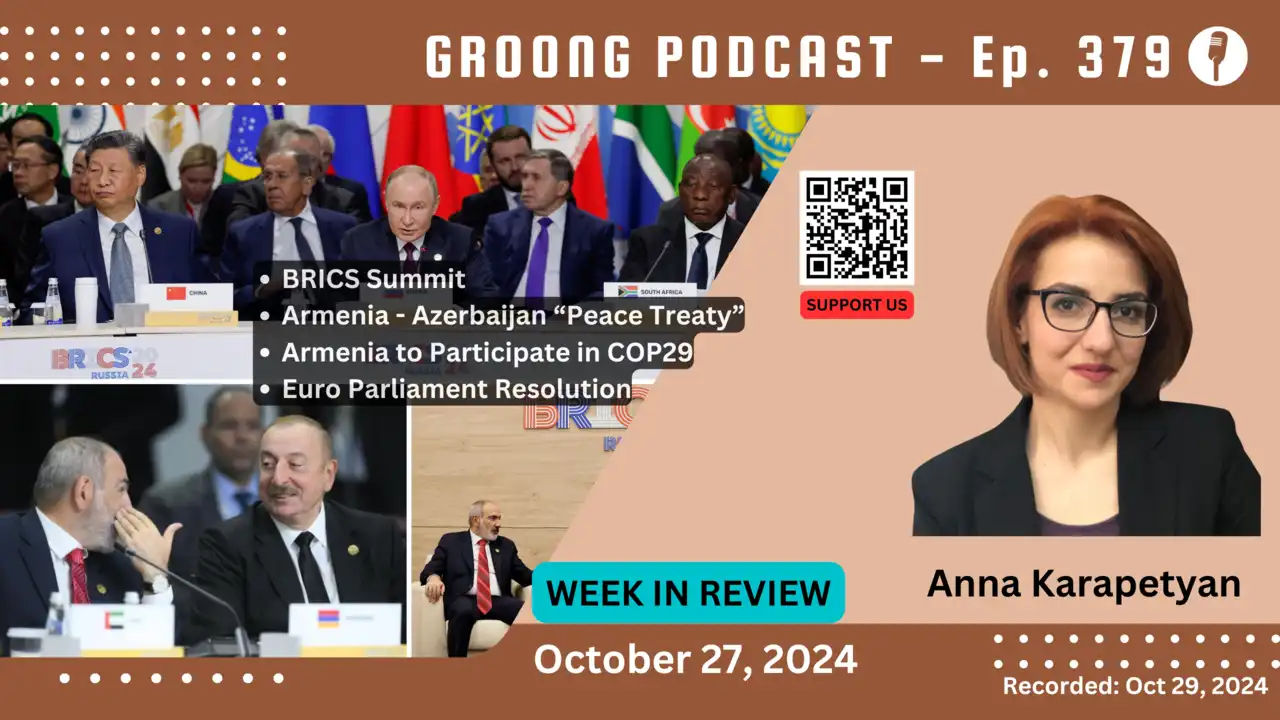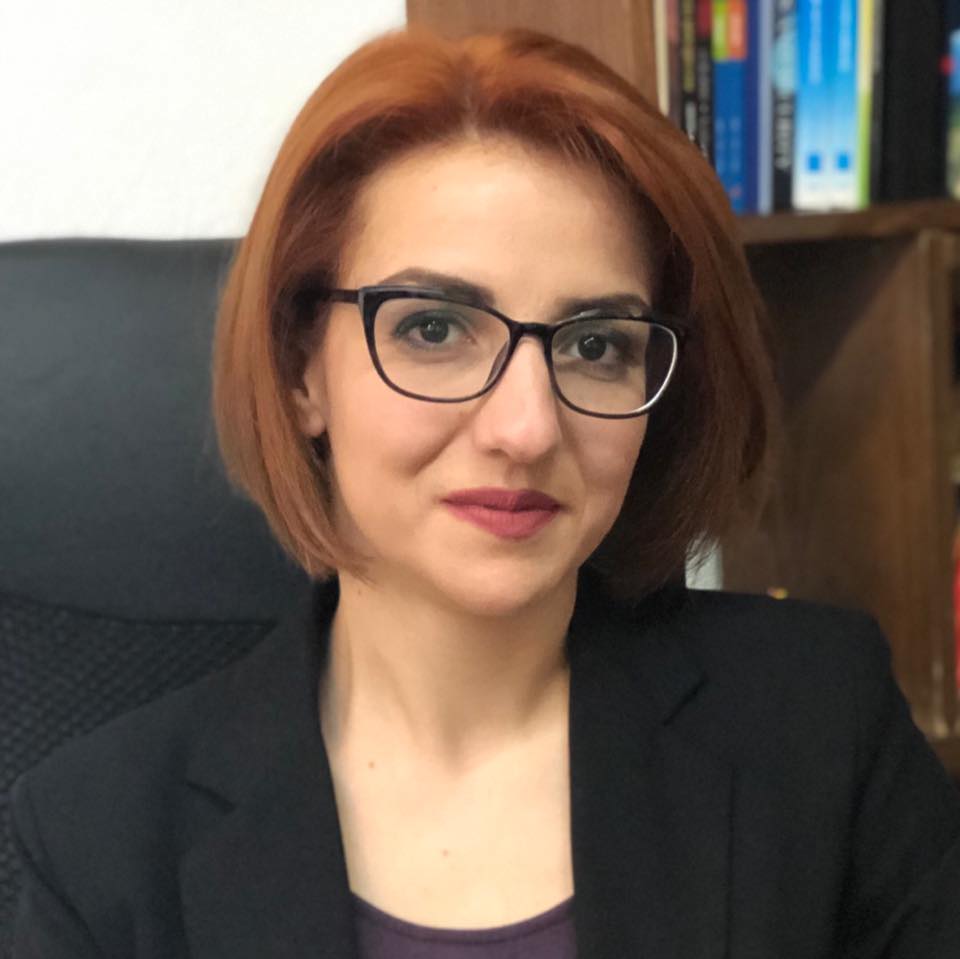
Groong Links:
Guest:
- Anna Karapetyan Director of the Insight Analytical Center for Applied Policy and Research.
Topics:
- Armenia at the BRICS Summit
- Armenia Azerbaijan Talks
- Armenia at COP29
- European Parliament Resolution
Episode 379 | Recorded: October 29, 2024
Show Notes
Topics This Week
BRICS Summit
During the BRICS summit held last week in Kazan, Russia, Armenia participated as an observer. While Pashinyan acknowledged the group’s agenda positively, the Armenian Foreign Ministry emphasized that Armenia has no plans to become a BRICS member.
A notable outcome of Armenia’s participation was Pashinyan’s meeting with Ilham Aliyev. In a short statement released afterwards, they instructed their foreign ministers to continue peace deal discussions “in order to finalize and sign it as soon as possible.” Pashinyan at the summit repeated that at least 80-90% of the content of the so-called peace deal is finalized and expressed his readiness to sign an interim document with only the content that is so far agreed upon, but in the past Azerbaijan has repeatedly stood its ground, demanding that complete agreement is reached on all points.
Questions:
- Let’s begin with BRICS, the organization. What is the benefit to Armenia for joining BRICS? And why won’t Armenia join it?
- What did Aliyev and Pashinyan talk about?
- In September, both Pashinyan and Aliyev had said that 80% of the document is already agreed upon. Now it’s become 80-90%. What new agreements have been reached?
- Is it possible that Aliyev will, at the last moment, agree to sign some kind of document that Pashinyan will present as a peace deal, as vacuous that deal may be?
- If only to affect internal Armenian politics and give Pashinyan a campaign tool. Pashinyan can say: “see I brought peace” and win the next elections.
Armenia - Azerbaijan
A number of developments occurred this past week in the realm of the Armenian Azerbaijani so-called peace process. While almost two weeks ago the US State Department appeared to downplay expectations of an imminent deal, this past week Joe Biden’s special envoy Michael Carpenter visited Baku and Yerevan to urge Aliyev and Pashinyan to finalize an agreement.
As we discussed in our previous Week In Review (episode 376, with Sergei Melkonian), at the conclusion of the 3+3 meeting in Istanbul, Armenia rejected a proposal by the “Big 3” to move the peace process to that platform.
Finally, apparently right after the BRICS summit, the Azerbaijani government announced that Aliyev had signed the agreement on border demarcation principles. On the Armenian side, this agreement was railroaded by Pashinyan through the government’s rubber stamp machinery, the Armenian Constitutional Court, and the Parliament. And of course, Armenia’s president, also rubber stamped the document, apparently shortly before Aliyev signed it.
Questions:
- What’s in this demarcation and delimitation principles agreement, and does it give Armenia anything?
- The agreement basically says that the two countries can agree to anything and move forward on the basis of that agreement.
- No maps were specified, there was nothing concrete to hold on to as a principle.
- In fact, the Armenian government admitted that different maps will be used for different regions of the border, despite previously saying that the Alma Ata declaration specified a distinct border at the time of the dissolution of the USSR.
- What was Michael Carpenter’s message to Aliyev and Pashinyan? Has it lit some fire under Aliyev to move towards an agreement?
- How can Armenia find value in the 3+3 platform?
Potential Withdrawal of EU Monitors
The agreement on the EU Monitoring mission in Armenia was signed in February 2023 and is due to expire in 2 years, that is in 2024. The Armenian government had previously justified this mission, armed only with binoculars, as an additional layer of security.
At the same time as there are discussions in Armenian political circles on renewing the monitoring agreement, Azerbaijan has increased its rhetoric against the EUMA. Azerbaijani media is replete with negative articles about the mission, claiming that the mission is collecting intelligence on Azerbaijan. And recently, Aliyev himself complained that the EU mission was prolonged without consulting Azerbaijan.
And in his speech in parliament, the foreign minister of Armenia Ararat Mirzoyan said that as long as there is no signed “peace treaty”, then Armenia continues to have concerns about Azerbaijani actions and therefore a “neutral third party” is justified.
Questions:
- Does Mirzoyan’s statement imply that the EU monitors may leave after an agreement is signed?
COP29
Members of the Armenian government are now discussing the level of participation at Azerbaijan’s COP29 climate change conference. So it’s clear that they intend to attend.
Questions:
- Should Armenia go? What’s in it for Armenia, to go to Baku and legitimize Aliyev’s horrible human rights violations, holding onto Armenian prisoners or war, etc?
- Is it Pashinyan government’s official policy to legitimize Aliyev’s record of ethnic cleansing? Because according to Alen Simonyan, Aliyev had every right to attack Artsakh and depopulate it.
Euro Parliament Resolution
On October 24 the European parliament passed a resolution addressing the human rights situation in Azerbaijan, as well as its relations with Armenia. The resolution demands Azerbaijan to withdraw from sovereign Armenian territory, and prescribes readiness to apply sanctions if Azerbaijan doesn’t. The resolution also proposes support for Armenia through the European Peace Facility, as well as extending the mission of the EU observers in Armenia.
Questions:
- What can be expected from such resolutions, considering that the executive body of the EU conducts policies completely orthogonal to the spirit of such resolutions?
- We know that the Canadian foreign ministry made such announcements. The presidential candidates in the US are talking about it. Even if the Armenian government’s policy is to not strive for the rights and security of the ethnically cleansed population of Artsakh, can interest groups who have a stake in the issue use such announcements and resolutions?
Wrap-up
That’s our show! We hope you found it useful. Please find us on Social Media and follow us everywhere you get your Armenian news.
Thanks to Laura Osborn for the music on our podcasts.
Guests

Anna Karapetyan
Dr. Anna Karapetyan is the Director of the Insight Analytical Center for Applied Policy and Research. She has a PhD in political sciences, and is a lecturer at the Russian-Armenian University.
Hosts

Asbed Bedrossian
Asbed Bedrossian is an IT professional, and for years oversaw the central IT enterprise infrastructure and services at USC. His decades of experience spanned across IT strategy, enterprise architecture, infrastructure, cybersecurity, enterprise applications, data center operations, high performance computing, ITSM, ITPM, and more.
Asbed founded the Armenian News Network Groong circa 1989/1990, and co-founded the ANN/Groong podcast in 2020.

Hovik Manucharyan
Hovik Manucharyan is an information security engineer who moved from Seattle to Armenia in 2022. He co-founded the ANN/Groong podcast in 2020 and has been a contributor to Groong News since the late 1990s.
Disclaimer: The views expressed by Hovik Manucharyan on the ANN/Groong podcast are his own and do not necessarily reflect the opinions of his employer or any other organization.